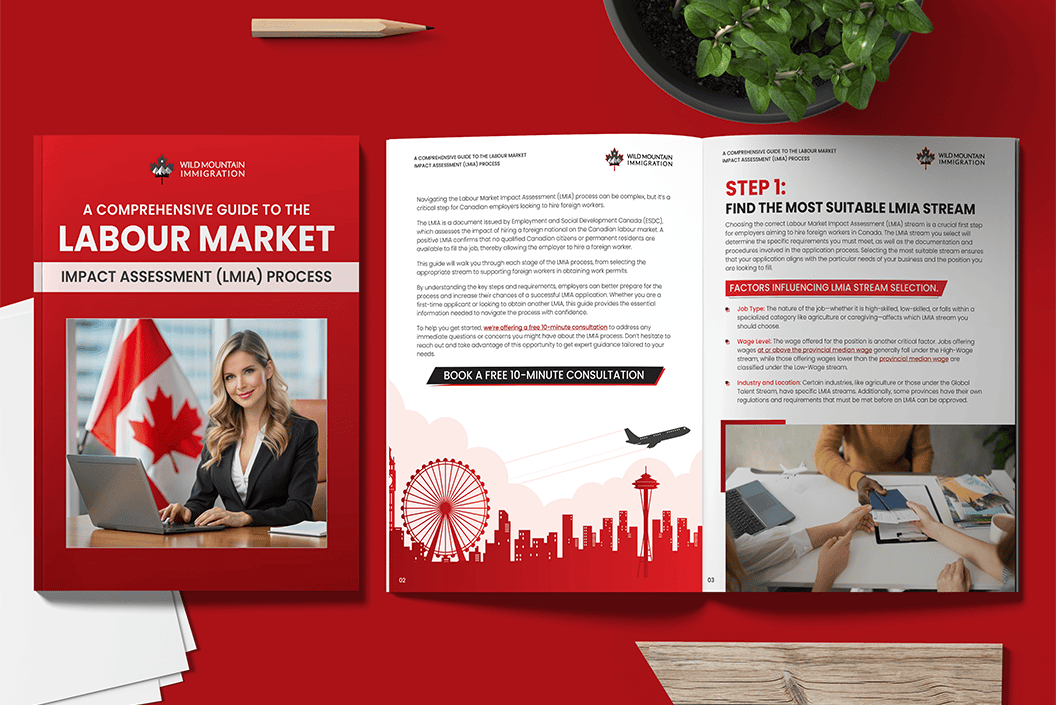Canada’s Temporary Foreign Worker Program (TFWP), designed to address labour shortages when no qualified Canadians are available, is seeing significant updates in 2024. The LMIA new rules, particularly focused on the low-wage stream, introduce stricter guidelines that will impact how employers hire foreign workers.
In this post, we’ll explain the key Labour Market Impact Assessment new rules introduced by the Canadian government, their impact on employers, and strategies to navigate these changes while staying compliant. We’ll also explore alternative immigration options for retaining foreign workers under the new restrictions.
LMIA New Rules in 2024
In 2024, the Canadian government introduced several new measures to tighten the Temporary Foreign Worker Program (TFWP), particularly affecting low-wage positions. These changes are designed to reduce reliance on foreign workers and prioritize job opportunities for Canadian citizens and permanent residents. Here’s a breakdown of the key LMIA new rules:
Refusal to Process LMIAs in Certain Regions
Starting September 26, 2024, the government will refuse to process LMIA applications for low-wage positions in census metropolitan areas where the unemployment rate is 6% or higher. The only exceptions are for jobs in critical sectors, including:
- Primary agriculture
- Food processing
- Fish processing
- Construction
- Healthcare
This rule aims to address regions with high unemployment rates by ensuring that local workers are given priority for job openings.
Reduced Cap on Low-Wage Foreign Workers
Another significant change is the reduction in the cap on the number of low-wage foreign workers employers can hire. The previous limit of 20% of the workforce for low-wage roles is now reduced to 10%. However, employers in certain sectors, such as agriculture, construction, and healthcare, may still be exempt from this cap.
Reduced Duration of Employment for Low-Wage Workers
For employers hiring foreign workers in the low-wage stream, the maximum duration of employment has been reduced from two years to one year. This change makes it more difficult for employers to retain foreign workers long-term and increases the need for frequent LMIA renewals, adding more administrative burden.
Temporary Suspension of Low-Wage LMIA Processing in Montreal
In a specific measure targeting the Montreal economic region, the processing of new LMIA applications for low-wage positions has been suspended from September 3, 2024, to March 3, 2025. This suspension applies to jobs offering an hourly wage below $27.47/hour, which is the current median wage in Quebec. However, the suspension does not apply to jobs in agriculture, food processing, construction, healthcare, or education.

Canadian Immigration Consultant
Let our expert team guide you through the complexities of immigrating to Canada. We provide personalized, step-by-step support to ensure a smooth and stress-free process.
How LMIA New Rules Impact Employers in 2024
These new LMIA rules mean that employers hiring low-wage foreign workers need to reconsider their strategies. The tighter restrictions on LMIA approvals and caps on foreign workers may lead to longer hiring timelines and more complex processes for certain industries.
Key Impacts:
- Restricted Access: In regions with high unemployment, many low-wage positions will no longer be eligible for LMIA processing, making it harder for employers to hire foreign workers.
- Increased Administrative Burden: The reduced employment duration from two years to one year means that employers will need to file for LMIA renewals more frequently, increasing paperwork and costs.
- Lower Cap: Employers relying on foreign workers for low-wage positions will now be limited to 10% of their workforce, which may necessitate increased efforts to recruit local workers.
Alternative Immigration Strategies for Employers
With these new LMIA rules in place, many employers will need to explore alternative ways to attract and retain foreign talent. Here are some strategies that can help:
Leverage the International Mobility Program (IMP)
The International Mobility Program (IMP) allows employers to hire foreign workers without needing an LMIA. The IMP supports economic, social, and cultural goals and includes streams such as:
- Francophone Mobility: For hiring French-speaking workers.
- Reciprocal Employment: Allows foreign workers to work in Canada if similar opportunities are available for Canadians abroad.
Employers in industries exempt from the new LMIA restrictions can consider utilizing the IMP to retain their foreign workforce.
Prioritize Permanent Residence (PR) Pathways
Employers should also focus on helping their foreign workers transition to permanent residency (PR). By offering support for Express Entry, Provincial Nominee Programs (PNPs) or covering the costs of PR applications, employers can reduce the need for repeated LMIA renewals and ensure long-term employee retention.
Offer Promotions or Pay Raises
For employees close to the median wage, employers may consider offering promotions or salary increases. This can allow them to apply under the high-wage LMIA stream, which is not subject to the same restrictive rules as the low-wage stream. However, this should be carefully evaluated to maintain pay equity within the organization.
Explore Global Talent Stream
For employers in the technology, engineering, or specialized fields, the Global Talent Stream (GTS) offers a fast-track LMIA process with fewer restrictions. This stream can help companies quickly bring in highly skilled foreign professionals without facing the same limitations as the low-wage stream.

Download Your Free LMIA Process Guide
Our guide offers clear, step-by-step instructions to help you avoid common pitfalls and increase your chances of approval.
Compliance with Employment Laws and Labor Standards
As employers adapt to the LMIA new rules, it’s essential to continue complying with employment laws and labour standards. Employers must ensure that their foreign workers are treated fairly and that compensation packages are competitive with Canadian standards. Additionally, in unionized environments, employers should work closely with unions to create policies that benefit both the organization and its employees.
Steps to Apply for an LMIA
To successfully apply for an LMIA, employers must follow several key steps:
- Identify the Correct NOC Code: Classify the job correctly using the National Occupational Classification (NOC) system, as this will determine wage levels and other conditions.
- Advertise the Position: Employers must prove they made genuine efforts to hire Canadians or permanent residents. This usually involves posting the job on the Government of Canada’s Job Bank and other platforms for at least four weeks.
- Submit the LMIA Application: Once recruitment efforts are complete, employers can submit their LMIA application to ESDC, along with proof of recruitment, job offer details, and the required fee.
- Receive the LMIA Decision: ESDC will assess the application and issue a decision. A positive LMIA allows the employer to proceed with hiring a foreign worker.
Employer Responsibilities After Receiving an LMIA
Once an LMIA is approved, employers must:
- Provide the foreign worker with the LMIA approval and job offer.
- Ensure the foreign worker applies for their work permit before the LMIA expires (typically six months).
- Comply with obligations such as providing return airfare, suitable housing, workplace insurance, and ensuring a safe working environment.

Challenges and Best Practices for Employers
Employers applying for an LMIA can face several challenges. Here are common pitfalls and best practices to avoid them:
- Mistakes in LMIA Application: Errors like missing information, incorrect NOC classification, or insufficient supporting documents can result in delays or denials.
- Not Meeting Recruitment Requirements: Inadequate recruitment efforts or not advertising for the required duration can lead to LMIA rejection.
- Advertising Mistakes: Failure to follow ESDC’s strict advertising guidelines, such as using incorrect platforms or not providing sufficient job details, can lead to refusal.
Best Practices:
- Ensure job ads meet ESDC guidelines and are posted on multiple platforms.
- Maintain detailed documentation of recruitment efforts.
- Stay informed of wage requirements and local employment laws to avoid issues during the application process.
Conclusion
The LMIA new rules introduced in 2024 place additional restrictions on employers seeking to hire low-wage foreign workers. From regional refusals to process applications to reduced employment durations and lower workforce caps, these changes are designed to ensure that Canadian workers are prioritized.
Employers looking to maintain their foreign workforce must rethink their recruitment strategies and consider alternative immigration pathways like the International Mobility Program (IMP) and permanent residency support. Staying compliant with new regulations and planning ahead will be crucial for success in this changing immigration landscape.
How We Can Help
At Wild Mountain Immigration, we specialize in guiding employers through the evolving LMIA regulations. Our team of experienced immigration consultants can help you navigate the complexities of the Temporary Foreign Worker Program, find alternative solutions under the International Mobility Program, and assist with permanent residency applications for your employees.
Contact us today for personalized advice and support to ensure your business stays compliant with the new LMIA rules while retaining top foreign talent.
LMIA FAQs
The new LMIA rules include a refusal to process low-wage LMIA applications in regions with an unemployment rate of 6% or higher, a reduction in the cap on low-wage foreign workers to 10%, and a decrease in the maximum employment duration for low-wage workers from two years to one year.
From September 3, 2024, to March 3, 2025, LMIA applications for low-wage positions in the Montreal economic region will not be processed unless the job offers a wage above the Quebec median hourly wage of $27.47/hour.
Yes, through the International Mobility Program (IMP), employers can hire foreign workers without needing an LMIA. The IMP includes streams such as Francophone Mobility and Reciprocal Employment, which offer alternative pathways for hiring foreign talent.
Jobs in sectors such as primary agriculture, food processing, fish processing, construction, and healthcare are exempt from some of the new LMIA restrictions, allowing more flexibility in hiring foreign workers in these industries.
Employers can focus on helping their foreign workers transition to permanent residency by supporting applications through Provincial Nominee Programs (PNPs) or Express Entry. Additionally, employers can use the high-wage stream or the Global Talent Stream for workers with higher skill levels or specialized expertise.
Processing times for LMIA applications vary by stream. For example, the Global Talent Stream typically takes 1-2 weeks, while high-wage and low-wage streams take around 2-6 months.
Yes, employers can apply for multiple LMIAs simultaneously, particularly for high-wage roles where there is no cap. However, for low-wage positions, employers must adhere to the 20-30% limit.
Yes, an LMIA can be refused if the employer fails to meet recruitment requirements, doesn’t advertise the position adequately, or submits an incomplete or incorrect application.
Robert Bastow-Page
Robert Bastow-Page is the co-founder at Wild Mountain Immigration. Having personally gone through the Canadian immigration process, Robert brings a unique understanding and commitment to helping people successfully navigate their own immigration journeys.
Canadian immigration
Learn about moving to Canada, the Express Entry immigration process, working in Canada, studying in Canada, and more.
January 12, 2025
Trudeau Steps Down – What’s in Store for Canada’s Immigration Policies?
Prime Minister Justin Trudeau has announced his resignation as the leader of the Liberal Party and…
December 11, 2024
New Immigration Pathways Canada 2025: What You Need to Know
Canada is introducing several new immigration pathways in 2025, offering exciting opportunities for…
December 10, 2024
Major Express Entry Changes Proposed to Address LMIA Fraud
Canada’s immigration system may soon undergo significant Express Entry changes, as Immigration…
Start Your Canadian Immigration Journey
Our experts make the process clear, stress-free, and successful, so you can move forward with confidence and focus on what matters most.

Get Started Today
"*" indicates required fields



